
Pacific Asia Journal of the Association for Information Systems
Scope & Guideline
Navigating the Complexities of Information Systems with Expertise
Introduction
Aims and Scopes
- Information Systems and Digital Transformation:
The journal explores how information systems facilitate digital transformation across various sectors, focusing on the adoption of new technologies and their impact on business models. - Sustainability and Social Inclusion:
Research published in the journal examines the role of information systems in promoting sustainable practices and social inclusion, particularly in developing countries within the Pacific Asia region. - Artificial Intelligence and Emerging Technologies:
There is a strong focus on the implications of artificial intelligence and other emerging technologies on organizational performance, decision-making, and user experiences. - Governance and Policy in Information Systems:
The journal addresses governance mechanisms related to information systems, exploring how policies can influence technology adoption and management within organizations. - User Behavior and Experience:
Understanding user behavior in relation to information systems is a core area, with studies focusing on user satisfaction, engagement, and the impact of digital initiatives on consumer behavior.
Trending and Emerging
- Digitalization and Sustainable Practices:
A significant trend is the exploration of how digitalization can facilitate sustainable consumption and practices, reflecting a growing awareness of environmental issues and corporate responsibility. - Integration of Artificial Intelligence in Business Processes:
There is an increasing focus on the integration of AI technologies into various business processes, examining both the benefits and challenges associated with AI adoption. - Mixed-Methods Research Approaches:
The use of mixed-methods research is on the rise, allowing for a more comprehensive understanding of complex phenomena in information systems by combining qualitative and quantitative data. - Impact of Social Media on Consumer Behavior:
Research examining the influence of social media platforms on consumer behavior is trending, particularly in relation to engagement strategies and content creation. - Governance of Emerging Technologies:
There is an emerging interest in the governance frameworks that guide the adoption and management of new technologies, particularly in areas like blockchain and cloud computing.
Declining or Waning
- Traditional IT Management Approaches:
There is a noticeable decline in research focused on conventional IT management practices, as the field shifts towards more innovative and flexible approaches to technology governance. - Static Models of User Adoption:
Research utilizing static models to understand user adoption of technology is becoming less prevalent, with a movement towards dynamic approaches that consider changing user behaviors and contexts. - Focus on Legacy Systems:
Studies focusing on legacy systems and their management are diminishing as organizations increasingly adopt cloud-based and agile solutions that challenge traditional paradigms. - Non-Digital Consumer Behavior Studies:
Research that examines consumer behavior in non-digital contexts is declining, as the journal's focus shifts towards the influence of digital and social media on purchasing decisions. - Basic Data Analysis Techniques:
There is a waning interest in basic data analysis techniques, as the demand for advanced analytics and machine learning applications continues to grow.
Similar Journals
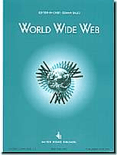
WORLD WIDE WEB-INTERNET AND WEB INFORMATION SYSTEMS
Advancing Knowledge in Internet and Information SystemsWORLD WIDE WEB - INTERNET AND WEB INFORMATION SYSTEMS, published by Springer, is a leading academic journal that focuses on the cutting-edge areas of Internet technologies and web-based information systems. With an esteemed ISSN of 1386-145X and an E-ISSN of 1573-1413, this journal has been a significant contributor to the fields of Computer Networks and Communications, Hardware and Architecture, and Software since its inception in 1998. The journal consistently ranks in the Q1 category across these fields, reflecting its high impact and relevance, evidenced by its impressive Scopus rankings where it stands in the upper percentiles (79th for Computer Networks and Communications, 77th for Hardware and Architecture, and 75th for Software). Researchers, professionals, and students looking to stay at the forefront of web information systems will find a wealth of valuable resources and innovative research compellingly presented in this journal, available for publication until 2024.

IADIS-International Journal on Computer Science and Information Systems
Fostering Excellence in Information Systems ResearchIADIS-International Journal on Computer Science and Information Systems is a prominent platform dedicated to advancing research and knowledge in the field of computer science and information systems. Published by IADIS, this journal aims to disseminate innovative findings and theoretical advancements that address contemporary challenges and trends in technology. The journal fosters a rigorous peer-review process, ensuring that only high-quality research is shared with its audience, which includes researchers, professionals, and students from around the globe. Although the journal is not currently open access, it serves as a vital resource for those looking to deepen their understanding of the evolving landscape of computer science. The ISSN of this journal is 1646-3692, and it boasts a strong commitment to promoting interdisciplinary communication and collaboration in the realm of information technology, making it an essential read for anyone looking to stay at the forefront of this fast-paced field.
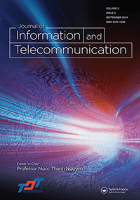
Journal of Information and Telecommunication
Fostering Collaboration, Enhancing Global Discourse.Journal of Information and Telecommunication, published by TAYLOR & FRANCIS LTD, is a distinguished open access journal that has been enhancing the global discourse since its establishment in 2017. With an ISSN of 2475-1839 and an E-ISSN of 2475-1847, this journal is located in the United Kingdom and dedicates its focus to the fields of information technology, telecommunications, and related disciplines. Boasting a respectable Q2 quartile ranking across various categories including Computer Networks and Communications, Electrical and Electronic Engineering, and Computer Science Applications in 2023, it ranks notably in the top percentiles of scopus rankings, asserting its significance in the academic community. The journal's commitment to open access since its inception has fostered widespread accessibility, encouraging research dissemination and collaboration on a global scale. By providing a platform for high-quality research, it aims to unite researchers, professionals, and students in their pursuit of innovation and excellence in the ever-evolving digital landscape.

Australasian Journal of Information Systems
Exploring the Frontiers of Information Technology.The Australasian Journal of Information Systems (AJIS), published by the University of Canberra’s Faculty of Information Sciences & Engineering, is a leading open-access journal that has been fostering scholarly communication in the realms of information systems and technology since its inception in 1993. With an ISSN of 1449-8618 and E-ISSN 1326-2238, the journal is headquartered in Australia and provides a platform for innovative research and thought leadership in key areas such as business management, human-computer interaction, and information systems management. Recognized for its quality and impact, AJIS boasts a commendable Q2 ranking in several categories including Information Systems, reflecting its relevance and significance in the academic community. Researchers, professionals, and students alike will find this journal not only instrumental for advancing their knowledge but also essential for engaging with contemporary issues and trends in information sciences. With a commitment to open access, AJIS ensures that high-quality research is widely accessible, fostering collaboration and discourse across international boundaries.
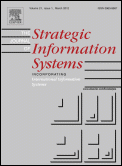
JOURNAL OF STRATEGIC INFORMATION SYSTEMS
Exploring Cutting-Edge Practices for Organizational SuccessJOURNAL OF STRATEGIC INFORMATION SYSTEMS, published by Elsevier, is a premier journal dedicated to the field of Information Systems, focusing on the intersection of strategic management and information technology. Established in 1991, this journal serves as a vital platform for presenting cutting-edge research and innovative practices that advance the understanding and application of information systems within organizations. With an impressive Q1 categorization in areas such as Information Systems, Management Information Systems, and Information Systems and Management for 2023, it firmly positions itself among the top journals in its field, boasting high visibility and a rigorous peer-review process. Its Scopus rankings are equally outstanding, with a 95th percentile rank in several relevant categories, indicating its influence and contribution to research and practice. Scholars and practitioners alike are encouraged to access this journal for its wealth of knowledge, insights, and case studies designed to bridge theory and practice in strategic information systems. At RADARWEG 29, 1043 NX AMSTERDAM, NETHERLANDS, this journal continues to foster critical dialogues and research that shape the future of information systems in the global business landscape.
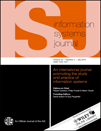
INFORMATION SYSTEMS JOURNAL
Advancing the Frontiers of Information Systems ResearchINFORMATION SYSTEMS JOURNAL, published by Wiley, is a prestigious academic journal dedicated to advancing the field of information systems, encompassing key areas such as computer networks, communication technologies, and software engineering. With an impressive track record of more than three decades, since its inception in 1991, the journal has secured a prominent position reflected in its Q1 rankings across multiple categories in 2023, placing it among the top-tier journals in Computer Networks and Communications, Information Systems, and Software. It boasts outstanding Scopus ranks, with percentiles in the 90s, positioning it as a vital source of cutting-edge research for professionals, academics, and students aiming to enhance their knowledge and contribute to the evolving landscape of information technology. Although it does not currently offer open access, the journal welcomes contributions that bridge theoretical insights with practical applications, fostering a dialogue among researchers and practitioners in the fast-paced world of information systems.
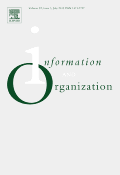
Information and Organization
Exploring Innovative Solutions for Organizational ExcellenceInformation and Organization is a leading academic journal published by ELSEVIER SCI LTD, specializing in the dynamic fields of Information Systems, Library and Information Sciences, Management Information Systems, and Organizational Behavior. With an impressive Impact Factor that reflects its esteemed reputation, this journal enjoys a Q1 ranking in multiple categories, highlighting its significance in both research and practical applications. Established in 1996, the journal has paved the way for innovative research, fostering a community of scholars and practitioners who are dedicated to exploring contemporary challenges and opportunities in information management and organizational practices. While primarily available through subscription, the journal's impact resonates globally, making it an essential resource for researchers, professionals, and students eager to advance their knowledge and contribute to the evolving discourse in these crucial areas. With its rigorous peer-review process and a focus on cutting-edge topics, Information and Organization is committed to disseminating high-quality research that informs practice and policy, ensuring its critical role in shaping the future of information and organizational studies.
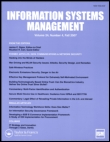
INFORMATION SYSTEMS MANAGEMENT
Leading the Way in Information Systems ResearchINFORMATION SYSTEMS MANAGEMENT is a premier academic journal published by Taylor & Francis Inc, focusing on the ever-evolving fields of Information Systems, Computer Science Applications, and Library and Information Sciences. With an impressive track record spanning over three decades since its inception in 1992, this journal is recognized in the top quartile (Q1) of its categories as of 2023, reflecting its influence and contribution to the research community. The journal holds commendable rankings in Scopus, positioned at #6 out of 280 in Library and Information Sciences, #44 out of 817 in Computer Science Applications, and #23 out of 394 in Information Systems, all showcasing its esteemed standing among peers. While the journal is not open access, it remains a vital resource for researchers, professionals, and students seeking to enhance their understanding of information systems management through high-quality, peer-reviewed articles that illuminate current trends, innovative technologies, and theoretical advancements in the field. With its dedicated commitment to scholarly excellence, INFORMATION SYSTEMS MANAGEMENT continues to be a leading platform for fostering knowledge dissemination and promoting academic dialogue.
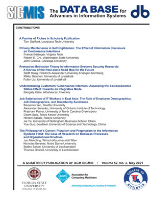
DATA BASE FOR ADVANCES IN INFORMATION SYSTEMS
Pioneering Trends in Information Systems ResearchDATA BASE FOR ADVANCES IN INFORMATION SYSTEMS, published by the Association for Computing Machinery, is a pivotal journal in the field of information systems, offering a platform for researchers and professionals to disseminate innovative findings and emerging trends. With its ISSN 0095-0033, this journal encompasses a broad spectrum of topics including data management, information retrieval, and systems architecture, making it a vital resource for scholars and practitioners keen on advancing knowledge in these areas. Although not an Open Access journal, it remains accessible through various academic institutions and libraries, maintaining its reputation as a cornerstone of scholarly communication. By fostering academic discourse, DATA BASE FOR ADVANCES IN INFORMATION SYSTEMS is committed to enhancing the quality and impact of research in the information systems domain, aiming to inspire the next generation of professionals and researchers.

Universal Access in the Information Society
Exploring the intersection of technology and universal access.Universal Access in the Information Society is a distinguished academic journal published by SPRINGER HEIDELBERG, focusing on the critical fields of computer networks, human-computer interaction, information systems, and software. Established in 2003, this periodical aims to disseminate innovative research that tackles the challenges of universal access to information and communication technologies, making it a vital resource for researchers, professionals, and students dedicated to enhancing digital inclusivity. With a commendable impact reflected in its Scopus rankings, it places in the second quartile for Computer Networks and Communications and Information Systems, as well as in the third quartile for Human-Computer Interaction, verifying its pivotal role in advancing knowledge within these domains. Although currently not open access, the journal offers comprehensive insights that are essential for anyone looking to contribute to or comprehend the evolving landscape of information societal access. The journal's commitment to bridging knowledge gaps makes it indispensable for both academic and practical applications in the Information Society.